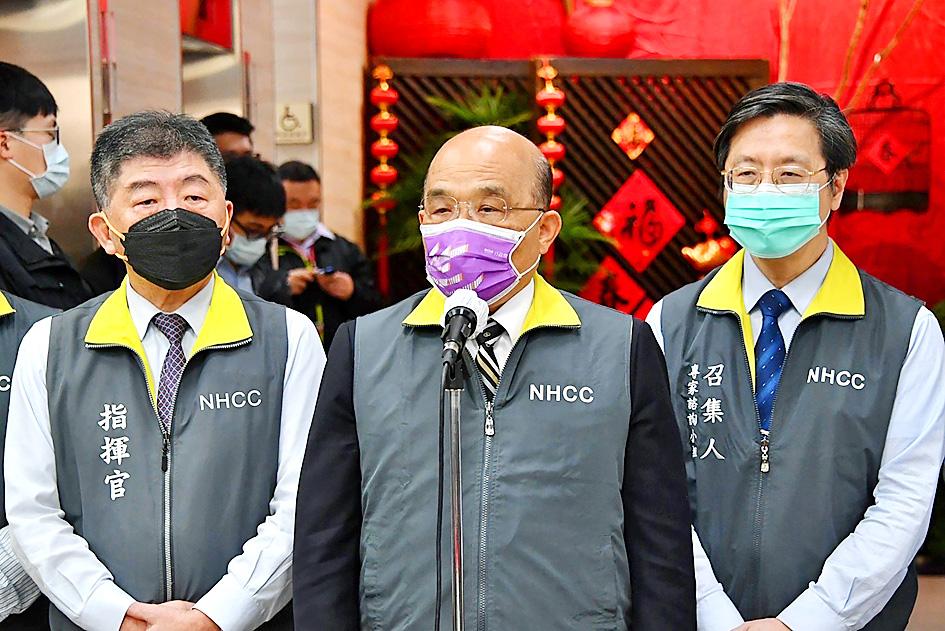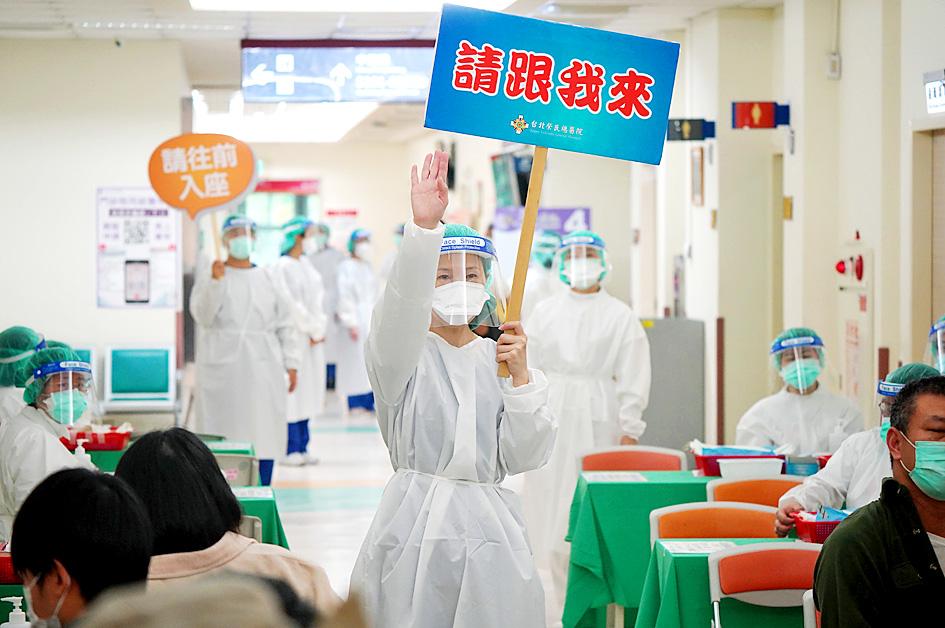Premier Su Tseng-chang (蘇貞昌) yesterday called on the public to “stay vigilant and prudent,” but added that there is “no need to be afraid” given a surge in domestic cases of the Omicron variant of SARS-CoV-2.
The Central Epidemic Command Center (CECC) on Saturday reported 82 new local infections, a high for this year.
“The Omicron variant spreads very fast, so all of a sudden, most of the cases reported around the world are Omicron cases,” Su said during a visit to the CECC yesterday. “Its rapid spread is the variant’s characteristic, but most infected people have mild symptoms, or even no symptoms, which is also the case in Taiwan.”

Photo courtesy of the Executive Yuan via CNA
“We urge everyone to stay vigilant and prudent, but there is no need to be afraid,” he said.
While the government is doing its best to slow down the spread of the Omicron variant, Su said that people should know that scientific evidence suggests that vaccines boost protection against COVID-19 and reduce the symptoms of those who become infected.
Su urged those who are not fully vaccinated or are eligible for a booster shot to make an appointment as soon as possible so that they can increase protection for themselves, their families and society as a whole.

Photo: CNA
On Friday, Su said that while the government is doing its best to achieve “zero COVID” conditions, it does not exclude the possibility that Taiwan might have learn to “live with COVID-19.”
Separartely, former vice president Chen Chien-jen (陳建仁), a public health specialist, wrote on Facebook: “We shouldn’t be afraid of living with the virus, and we must speed up in increasing full vaccination coverage.”
Before vaccines and antiviral drugs were developed, people could only rely on non-pharmaceutical interventions to keep the virus from spreading in communities, as the fatality rate of the disease was also higher, Chen said, adding that “zero COVID” was initially the goal.
As Omicron is more transmissible, but produces milder symptoms or no symptoms, getting vaccinated can induce the body’s humoral and cell-mediated immune responses, and increase protection from infection, severe illness, hospitalization or death, he said.
It is difficult for the world to eliminate such highly transmissible variants, so a “zero COVID” approach is impractical and people should be prepared to “live with” the virus, he said.
Rapid tests, vaccines and oral antivirals have been developed, and the goal for this phase of prevention should be arriving more rapidly at full vaccination coverage, he added.
In related news, Taiwan has purchased up to 10,000 courses of molnupiravir, an oral antiviral treatment for COVID-19 developed by US drugmaker Merck & Co.
While the CECC had said that the drugs would at the earliest arrive after the Lunar New Year holiday, sources yesterday said that the first delivery could arrive this morning.
Minister of Health and Welfare Chen Shih-chung (陳時中), who heads the CECC, said only that the center is keeping in close touch with the manufactuer regarding the matter.
Additional reporting by Lo Chi

AGING: As of last month, people aged 65 or older accounted for 20.06 percent of the total population and the number of couples who got married fell by 18,685 from 2024 Taiwan has surpassed South Korea as the country least willing to have children, with an annual crude birthrate of 4.62 per 1,000 people, Ministry of the Interior data showed yesterday. The nation was previously ranked the second-lowest country in terms of total fertility rate, or the average number of children a woman has in her lifetime. However, South Korea’s fertility rate began to recover from 2023, with total fertility rate rising from 0.72 and estimated to reach 0.82 to 0.85 by last year, and the crude birthrate projected at 6.7 per 1,000 people. Japan’s crude birthrate was projected to fall below six,

US President Donald Trump in an interview with the New York Times published on Thursday said that “it’s up to” Chinese President Xi Jinping (習近平) what China does on Taiwan, but that he would be “very unhappy” with a change in the “status quo.” “He [Xi] considers it to be a part of China, and that’s up to him what he’s going to be doing, but I’ve expressed to him that I would be very unhappy if he did that, and I don’t think he’ll do that. I hope he doesn’t do that,” Trump said. Trump made the comments in the context

SELF-DEFENSE: Tokyo has accelerated its spending goal and its defense minister said the nation needs to discuss whether it should develop nuclear-powered submarines China is ramping up objections to what it sees as Japan’s desire to acquire nuclear weapons, despite Tokyo’s longstanding renunciation of such arms, deepening another fissure in the two neighbors’ increasingly tense ties. In what appears to be a concerted effort, China’s foreign and defense ministries issued statements on Thursday condemning alleged remilitarism efforts by Tokyo. The remarks came as two of the country’s top think tanks jointly issued a 29-page report framing actions by “right-wing forces” in Japan as posing a “serious threat” to world peace. While that report did not define “right-wing forces,” the Chinese Ministry of Foreign Affairs was

PREPAREDNESS: Given the difficulty of importing ammunition during wartime, the Ministry of National Defense said it would prioritize ‘coproduction’ partnerships A newly formed unit of the Marine Corps tasked with land-based security operations has recently replaced its aging, domestically produced rifles with more advanced, US-made M4A1 rifles, a source said yesterday. The unnamed source familiar with the matter said the First Security Battalion of the Marine Corps’ Air Defense and Base Guard Group has replaced its older T65K2 rifles, which have been in service since the late 1980s, with the newly received M4A1s. The source did not say exactly when the upgrade took place or how many M4A1s were issued to the battalion. The confirmation came after Chinese-language media reported